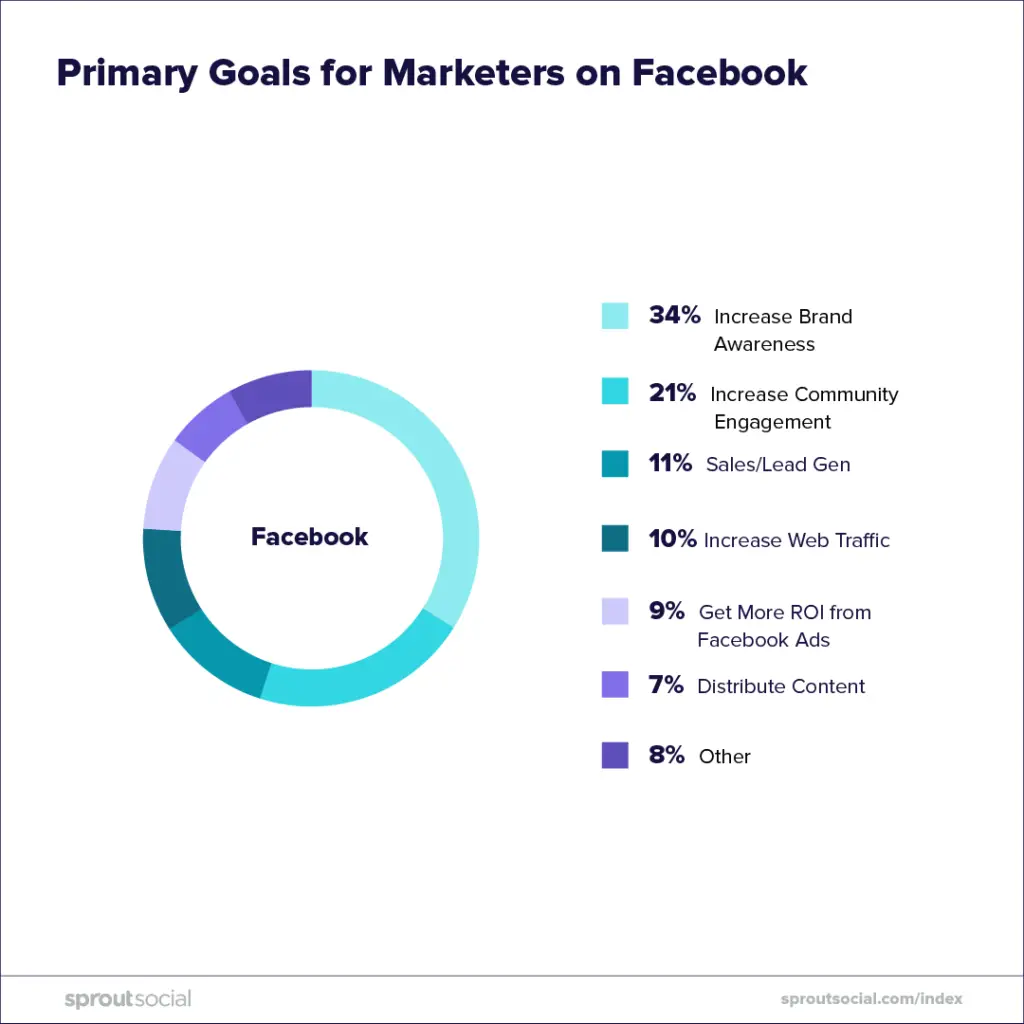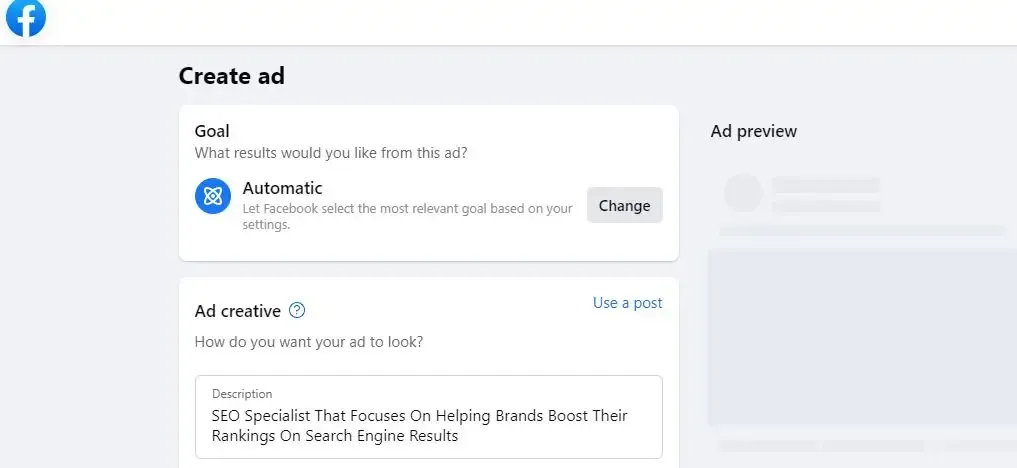In this article, you’ll learn:
Facebook, a social media platform with over 2 billion active users, is a powerful channel for social media marketing. A lot of businesses are competing on it to attract a target audience who has an interest in what they offer. And if you don't have sound marketing strategies that will move the needle as a beginner, you will remain an underdog and struggle to achieve your goal.
In this guide, I will show you 10 Facebook marketing strategies you should implement as a beginner.
What is Facebook marketing?
Facebook marketing refers to the practice of promoting a business by maintaining a consistent presence on Facebook. This can be in the form of posting content and interacting with a target audience, or running a paid campaign to create awareness and generate leads and sales.
Why does Facebook marketing matter to businesses?
After all, Facebook isn't the only social media platform. But why many businesses see it as a goldmine isn't a surprise. Social media is a vital marketing channel and Facebook has a lion's share of it. Many of your potential customers hang out on Facebook, and you will be leaving money on the table if you don't take a good message about your business to them. The advent of social media has made customers become informed about the choices they make. They want to know and interact with you before they patronize what you offer. This is practically what brands do on Facebook - always splashing their content in the news feed of their fans, positioning themselves as solutions to problems, and building brands in the mind of their target audience.
Let's look at the 10 Facebook marketing strategies you should implement.
1. Have a Clear Goal
You aren't on Facebook just to share pictures and videos. The aim is to market your brand. That's why you should set a clear goal from day one and work towards it.
What do you plan to achieve? Create awareness, grow your fans and followers, and generate leads and sales? These are important questions you should answer, otherwise you will lay a weak foundation that will affect you.
A 2018 survey by Sprout Social has it that 34% of marketers want to increase brand awareness on Facebook.

After identifying your goal, focus all your marketing efforts on achieving it within a set period.
2. Know Your Audience On Facebook
Knowing your audience and what resonates with them will inform you on the marketing strategy to deploy. It's of no use chasing an irrelevant audience just to grow your Facebook page and in the end, no one inquires about the products and services you offer. Use your Facebook page insight to analyze them. Take a look at their age, location, engagement with your post, and other key factors that suggest you are dealing with people who will find your products and services helpful. You can even spy on your Facebook competitors to see who their audiences are, and the content that works for them.
3. Create Content That Impact Your Audience
Why do you stop at a post when scrolling on your Facebook News Feed? I guess it's because you come across content that speaks to you. That's the type of content you should dish out to your audience. People follow your Facebook business page for a reason - the value they derive. Any day they feel your content no longer impacts them, they won't bother engaging them.
Your content should always highlight the problems they face, with solutions to them. Blog posts, images, infographics, videos, and even emojis cut it on Facebook. Facebook allows you to post articles of up to 60,000 characters at a time.
If you find it difficult to write content for Facebook, you can use any of the best AI writing tools to end writer's block. They offer templates for Facebook content. You can also use a content brief generator to help you create impactful content that will resonate with your audience.
Video also resonates with the Facebook audience. In fact, a study has it that Facebook videos get 4+ billion views a day.
4. Optimize Your Page, Group & Content
Just like Google, users search on Facebook and then use the filter option to narrow down to what they want to see. Optimizing your content will increase the chances of it showing up on search results, thereby boosting its organic reach. Content that goes viral on Facebook doesn't just happen. It takes optimization. It begins with optimizing your Facebook page and group. Let your background image, page, and group profile photo reflect your business. Use target keywords in describing your business. Choose a suitable category, and enter your email address, phone number, website (if any), and other key information. These make it easy for Facebook to boost your group and pages on search results.
For content, use keywords that relate to your business when posting. A video or image content should have a catchy caption. Some users watch videos on Facebook with the sound turned off, and it's only the caption that will entice them to watch. Keep your video and image descriptions short and concise, with relevant keywords in them. Use a video ratio of 4:5 to keep it on portrait, since many of the users watch Facebook videos on smartphones.
Canva has templates that you can use to create videos for Facebook:

5. Schedule Your Content
To stay organized, schedule your content. Whether you are posting on groups, pages, or Facebook stories, a schedule will keep you in line with your goals, and allow you to plan posts, promotions, and ads in advance. Leveraging creative analytics tools can help you refine your content strategy by understanding which types of posts resonate most with your audience, enabling you to optimize future content accordingly.If you have a social media content creator or manager, they will have prior knowledge of the content to work on. Facebook supports you to schedule your content on your Facebook page for free. But it's not advanced like social media scheduling tools like Buffer, Hootsuite, Meet Edgar, etc.
6. Leverage Chatbot
The use of chatbots isn't just a trend in digital marketing. It's a marketing strategy that helps businesses boost customer engagement, and it works in Facebook marketing. If you plan to sell on Facebook, you need a Facebook chatbot because you can't be online 24/7 to engage potential customers. A chatbot can handle that even while you sleep. Apart from engaging customers, chatbots can generate leads, and help customers make purchases seamlessly. With a process in place, they can offer customer service by answering common questions users ask about your business.
7. Don't Spam Links
Facebook wants to attract and retain audience on their platform, that's why the algorithm frowns at link spamming which drives users to other platforms. If you rely on organic reach to grow your business on Facebook, posting URLs consistently will hurt your organic engagement or even lead to shadow-banning. Be wary of it, and also ensure your target audience doesn't spam the comments with links.
There are tactics you can use to post links on Facebook.
You can add it to your bio and ask your audience to click on it after posting on your page or group.
Thankfully, there are link shortening and link-in-bio tools you can use. You can also leave them in the comments and ask your audience to check them there.
8. Create A Facebook Private Group
Apart from a Facebook business page, you need a Facebook private group. It's like building a community where your loyal audience can interact with you and one another. It helps you get a feel of what your customers think about your products, build lasting relationships and get feedback that can help you improve your products and services.
For example, you can create a poll to test how valuable a new product is to your target users.
Some businesses use FB groups to effectively offer customer support. A user who asks questions can get helpful answers from the admin, community manager, or even fellow users. It's an inner circle where you can update your customers with new developments in your products and services.
Below is a screenshot of Adam Enfroy’s private FB group, Blogpreneurs:

9. Launch Facebook Campaign
If your goal is to generate more leads and make sales faster, launching a Facebook campaign is important. Although you can generate leads through organic reach, it will take a longer time. Facebook understands the behavior of every user on its platform; it helps you reach them through ads.

While this can be expensive for a new brand with no ad budget, big brands with deep pockets don't mind because the ROI is worth it.
If you're considering this to generate leads, the first thing is to create a landing page that converts. Give your target audience reason to become leads, otherwise, they will hit the back button and bounce.
While you may hire a copywriter for your landing page copy, you can design the landing page yourself. First things first, get a clever, short, and memorable domain name for your landing page, such as one with .icu. New domain extensions, like .icu, can help in creating a standout landing page that attracts your audience's attention. Then you can use any of the page builders to design your landing page, and host it.
10. Track, Monitor & Analyze
The only way to know if your marketing strategies yield positive results is to track, monitor, and analyze them. From there, you know what works and doesn't.
Thankfully, Facebook has analytics features for pages and groups. Take a look at them frequently to see your wins and know where to up your game. For Ads, analyze performance at the end to see if you reached your goals.

Since you want to make informed marketing decisions, you may consider advanced Facebook analytics tools like Social pilot.
Wrapping Up
Facebook marketing is now a trend. The competition is fierce, and you need the right strategies to survive, otherwise, your efforts won't yield desired results. I've shown you 10 marketing strategies you should implement as a beginner, starting with getting your goals right. It's now time to overhaul your process, drop the strategies that don't work, and implement the ones you have learned today.
Author
LinkedIn




